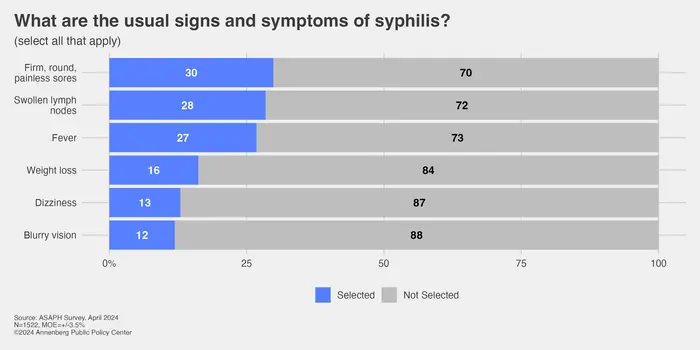Syphilis cases are on the rise around the globe, but many Americans don’t know the symptoms.
As part of the Annenberg Public Policy Center’s ASAPH survey in April 2024, a national probability sample of US adults was surveyed about their knowledge of the disease and other STIs.
Fewer than one-third of respondents identified any of the following as symptoms of syphilis:
- “firm, round, painless sores” (30% selected)
- “swollen lymph nodes” (28% selected)
- “fever” (27% selected)
- “weight loss” (16% selected)
- “dizziness or lightheadedness,” a sign of otosyphilis (13% selected)
- “blurry vision,” a sign of ocular syphilis (12% selected)
Just over half of American adults know that a case of syphilis can be permanently cured.
When it comes to prevention of syphilis, Americans have a higher level of knowledge. Among effective prevention strategies accurately identified by respondents:
- 78% correctly chose abstinence, or not engaging in sex
- 77% correctly chose using a condom
- 94% correctly did not select oral contraception (the pill)
- 89% correctly did not select wearing a diaphragm
- 78% correctly did not choose getting a vaccine (there is none)
With regard to other STIs, only one-third of the public knows that HPV (human papillomavirus) cannot be permanently cured and a third of the public does not know there is a vaccine to prevent it. Similarly, most people do not know whether mpox can be cured or whether a vaccine exists.
Among Americans, there appears to be more accurate knowledge regarding STIs generally. Large majorities know that someone with an STI can spread the STI to others even if there are no symptoms (91%); that medication can control HIV and prevent disease progression (87%); that an STI can be passed from a person who is pregnant to their baby (78%); and that HPV can lead to cancer in women (69%). Americans also recognize that it is not necessary to have multiple sexual partners in order to contract an STI (85%) and that having had gonorrhea does not confer immunity from future infections (68%).
For more on STIs, check out this video from DERM2024 faculty member Ted Rosen, MD.
Figure credit: Annenberg Public Policy Center

